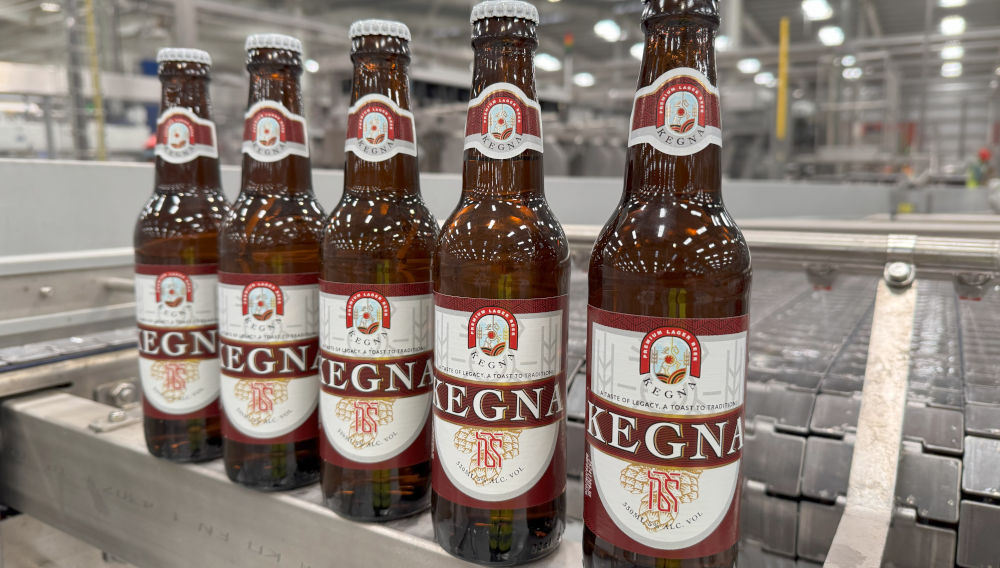Ethiopia’s Kegna beer officially launches on 14 June
Ethiopia | Kegna Beverages is making a USD 250 million investment in the beer market, officially opening a 3 million hl brewery in Ginchi, a town some 80 km west of the capital Addis Ababa in Oromia Regional State. The lager with the brand name Kegna (meaning “our”) is brewed with local barley and will hit the market immediately.
Incorporated in 2017 by some 5,000 shareholders, including farmers, the company is controlled by the Oromia state government and backed by the Development Bank of Ethiopia (DBE). Kegna’s management has set its sights on high-volume production to compete with established breweries, including Heineken, BGI (Castel) and a host of others.
At the heart of Kegna’s plan is a sprawling production site in Ginchi. The site is huge, covering about 100 ha, half of which is dedicated to the brewery, with the rest housing offices, warehouses, and guest accommodations. Although a look at the map suggests that the brewery is sitting in the middle of nowhere, it will eventually benefit from a revamped road to Addis Ababa, which the Ethiopian government promised to build as part of its national road development programme. This should ease distribution in the region and to other major markets.
Kegna is a social project
It is interesting to note that a regional government has moved back into brewing, after the national government’s big sell-off of state-owned breweries last decade. Executives say that the Oromia state government is actively working to create jobs through various initiatives, focusing on sectors like agriculture, agro-processing, and manufacturing. These efforts aim at driving economic growth and building trust with investors, showcasing Oromia, Ethiopia’s most populous region (45 million people), as ready-for-business.
According to executives, the plant will employ about 450 workers once fully operational, drawing labour from surrounding communities. The company will also tap into regional barley farming for a steady flow of inputs.
Although officially announced in 2017, the project has been delayed by several years: first by the covid pandemic, then by a severe shortage of foreign currency. Only when the DBE stepped in and injected reportedly USD 100 million in funds could Kegna finalise its deal with the German supplier Krones.
Taxes hurt
Kegna’s goal to quickly capture a significant market share faces yet another challenge: taxation. Local media report that in March this year, Ethiopia raised the excise tax rates for beer. Beer made from malt now faces a rate of 40 percent or ETB 28 (USD 0.20) per litre, whichever is higher. Beer produced exclusively from Ethiopian barley is taxed less severely at 35 percent or ETB 23 (USD 0.17) per litre, whichever is higher. Considering that beer is relatively affordable in Ethiopia, at least when compared to other African markets – a bottle of beer usually costs less than one dollar – profitability will be an issue.
In an effort to safeguard profits, Africa’s beer markets are often monopolies or duopolies. As the veteran beer investor in Africa, Pierre Castel, explained nearly 25 years ago: “It's better to have an undisputed monopoly than to be weakened by competition.” That makes Ethiopia’s beer market fairly crowded. With Kegna’s entry, six firms, operating a total of 14 breweries with an installed capacity of some 18 million hl, will be competing for drinkers’ wallets. The first (and only one so far) to throw in the towel was Diageo/Guinness. In 2022, it sold its Meta Abo brewery to BGI, allegedly for a symbolic price. It must have failed to reach its targets. A decade earlier, Diageo had paid USD 225 million to snap up Meta Abo in an auction.
Overoptimistic forecasters
Buoyed by significant consumption increases in the past decade, domestic beer output was forecasted to reach 25 million hl in 2023. That growth has not materialised, not least because of the cumulative effect of rising taxes and regional fees over the past few years. Security concerns in parts of the country have also placed immense pressure on brewers. Therefore, beer output is estimated to hit only 11 million hl this year, up from 10 million hl last year. Obviously, estimates vary widely, as there is no in-depth market research.
However, Ethiopia is the second most populous nation in Africa after Nigeria with a population of 135 million people. Each year, one million people enter into beer drinking age. As per capita beer consumption remains low, Kegna will see this as an opportunity to conquer a slice of the beer market.
Keywords
Ethiopia company news international brewing industry brands
Authors
Ina Verstl
Source
BRAUWELT International 2025

